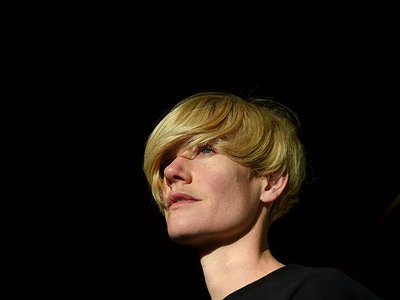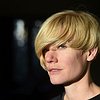Part 1
Name: Chloé Raunet
Nationality: Canadian
Occupation: Songwriter, Singer
Current Release: Crossing Prior Street on Ransom Note Records
Recommendations: ‘The Iceberg’ - Giorgio di Noto
This is a beautiful book of hidden photographs, a catalogue of the dark web. The pages are blank, printed with invisible ink. You reveal the images with a small ultraviolet torch, the same light drug enforcers use to hunt traces of narcotics. Like most good art, I think it works on many levels and talks as much about our current climate as it does the subject at hand.
‘Rizitiko’ - Venus Volcanism
The latest release on Weaponise Your Sound, this beautiful, hypnotic EP is the work of Greek musician Rena Rasouli. She’s reinterpreted traditional folk songs from her native Crete, intertwining the ritualistic material with electronic and natural ambient soundscapes. Traditionally sung by men, many of the songs were initially created by women. Singing them in a female voice, Rasouli’s music resonates with quiet defiance and a haunting sense of reclamation.
Website / Contact: If you enjoyed this interview with Chloé Raunet, use the C.A.R. website as a portal to take you deeper into her world.
When did you start writing/producing music - and what or who were your early passions and influences? What what is about music and/or sound that drew you to it?
I don’t have a musical background but started writing songs in my late teens. I kinda fell into it by chance on a trip to Detroit. My friend and I were there filming a documentary on techno music, which alongside electro was probably my main musical passion at the time. We ended up staying with this guy Marc Houle, who had an incredible collection of synths. Despite my love of the genre, I’d never seen one in real life. He showed me how they worked and sent me back to London with a cracked version of Reason. I didn’t really know what I was doing but started experimenting with simple little loops.
Even though I was making electronic music, from the onset I think I moved more towards traditional songwriting. I’d grown up listening to a mixed bag - folk, hip-hop, grunge, indie - and structurally, that’s what came more naturally. But I was still drawing from the sounds I heard on the dance floor every weekend. It was all a very intuitive process, and just for fun to begin with.
For most artists, originality is first preceded by a phase of learning and, often, emulating others. What was this like for you? How would you describe your own development as an artist and the transition towards your own voice? What is the relationship between copying, learning and your own creativity?
I’ve often wished I was the type to reference, but my approach has always been instinctive, down more to trial and error than anything. In saying that, I’m sure a whole sleuth of influences have seeped in subconsciously. I just never set out to emulate and spent my time playing around naively with the tools I had at hand - a laptop, mic, pen and paper. Early on a friend stepped in on bass and guitar duties and we formed a band, Battant. People started describing our sound as cold wave/post punk before I really knew what it was. It was after the fact I started discovering and listening to a lot of that stuff.
Over the years, I’m pretty sure the more I’ve learned, the more it’s subliminally permeated my own material, but I think there’s something to be said about keeping things raw and drawing from an inner vision. You could almost say I’m scared to lose the naivety of being DIY. If I know too much, maybe those happy accidents won’t happen.
What were your main compositional- and production-challenges in the beginning and how have they changed over time?
When I first started producing on my own as C.A.R. I was plagued with doubt. Over the years I’ve been fortunate to work alongside people who’ve taught and encouraged me. Gradually I’ve developed more self-belief. My relationship with singing is a good example. Since the start, I’ve lost count of the amount of people who’ve suggested I take lessons. It used to knock my confidence but now I think of my voice as an instrument in itself, one I’m happy to employ. It’s far from perfect, but it’s unique and sounds like me, plus the more I’ve practiced, the more it’s improved. Sure my tones aren’t for everyone, but I’m cool with that. I’d rather appeal to fewer people than to sound run of the mill.
What was your first studio like? How and for what reasons has your set-up evolved over the years and what are currently some of the most important pieces of gear for you?
My first set-up was a laptop and microphone. With Battant, we moved into a little nook in Andrew Weatherall’s Scrutton Street HQ. Down there we gradually began to acquire more gear. I think the first bit was a MicroKorg synth and then this big PA we bought off Add N To X for £50. Our guitarist brought in some of his amps and then we got a Poly 800, an 808 drum machine +++ The space was more a live/rehearsal room, but we eventually started recording our own demos there.
Nowadays I work from home. I’m pretty lucky to live in a big, Victorian terraced house with only one flatmate and we’ve had a dedicated studio space in one of the rooms since we moved in. I work standing up, facing a big synth rack full of shared kit. Over the years I’ve used the Poly 800, a MicroKorg, an electric guitar and this wonderful, red, homemade bass with a distinct non-bassy sound (super prominent in the second Battant album and the first C.A.R. LP). Now there’s a lot more to play with.
My flatmate’s Polysix and Yamaha CS01 feature on my new album, as well as the OP-1 and my Minilogue, which I also use live. Recently I’ve been getting a lot of use out of the Minitaur, Micro Freak, JU-06A and Analogue Solutions’ Impulse Command.
Out of all that though, I think the most important piece is my Beta 58 mic. I’ve been recording with it almost exclusively since the early days in Battant.
How do you make use of technology? In terms of the feedback mechanism between technology and creativity, what do humans excel at, what do machines excel at?
The bulk of what I do happens in the computer. Lyrics and melodies might come from my mind but they are recorded in, chopped up and transformed in the box. I’m not sure I’d differentiate between what humans and machines excel at. The latter is just another tool for making music, in the same way a guitar is.
Production tools, from instruments to complex software environments, contribute to the compositional process. How does this manifest itself in your work? Can you describe the co-authorship between yourself and your tools?
As I said above, the computer plays an integral role in all I do. It’s the vessel my ideas end up in. I’m a visual person and seeing my arrangement laid out before me is really important. I cut and paste, move entire segments around, build and demolish until the structure’s just right. I also use the computer to talk to external instruments, sending midi to synths, sometimes with an effect like an arpeggiator already running. It adds another level of control - something additional I can play with and tweak alongside the physical instrument.
Collaborations can take on many forms. What role do they play in your approach and what are your preferred ways of engaging with other creatives through, for example, file sharing, jamming or just talking about ideas?
Over the years I’ve done many collaborations, some more successful than others. I’d say at the moment, I’m most comfortable composing by myself and then reaching out when it comes to the mix. My studio is more of a writing room and not really suitable for anything else.
I have a couple long term collaborators I work with. Once the initial ideas are down, I think it’s important to get additional input. When you’re working on your own you can get locked in a narrow view and end up too focussed on one thing. Bringing in an extra, external set of ears can help reveal the big picture, highlighting things you might have missed. I’m still a bit of a lone wolf so with most people, I prefer to file share. It’s only when I really know someone I feel comfortable enough to sit down in the studio and bounce ideas around.






